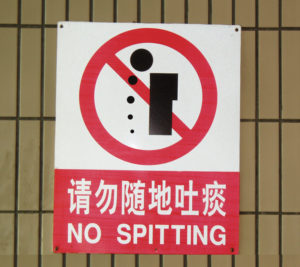There have been numerous unsuccessful attempts to eliminate spitting in public (suidi tutan 随地吐痰) in the name of civilisation and modernity, and not only at the time of the New Life Movement in the 1930s. Anti-spitting campaigns proliferated in the 1950s. Deng Xiaoping again attacked ‘this unhealthy habit’ in the 1980s. Beijing held public education events on the subject before the 2008 Olympics, and the city of Shenyang in the northeastern Liaoning province sponsored its own anti-spitting campaigns in 2010 and 2012.
There are parallels between the early twentieth-century efforts to stop bad habits and step out of ‘backwardness’ and many twenty-first-century national and provincial campaigns to promote etiquette and manners. For example, in preparation for the 2008 Beijing Olympics, the eleventh day of each month was proclaimed ‘Queuing Day’ (paiduiri 排队日), and government employees marshalled people who were not used to lining up for anything to queue in an orderly fashion. In 2009, reviving a formula first introduced in 1995, Shanghai launched a ‘Seven Nos’ campaign that prohibited spitting, littering, vandalism, damaging greenery, jaywalking, smoking in public places and swearing. Also, before the opening of the 2010 Shanghai World Expo, officials distributed booklets on one hundred ways to improve manners as part of the ‘Let’s Become Lovely Shanghainese’ campaign.



